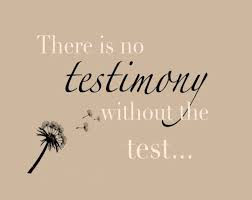How to Write a Powerful Testimony: Tips to Transform Your Story into Healing and Impact
- Dr. Deilen Michelle Villegas

- May 13, 2025
- 3 min read

By Dr. Deilen Michelle Villegas, Ph.D.
Author | Holistic Healer | Trauma Recovery Expert | Founder of The Shamanic Goddess, LLC
Why Your Testimony Matters
Your story is not just your past—it’s your power.
Writing a personal testimony is a transformative act of healing, liberation, and connection. Whether you're sharing your journey in a book, on a blog, in a workshop, or with a community, your testimony can:
Inspire others to begin their healing journey
Offer hope to those still struggling
Reclaim your voice after trauma
Bring light to truth that was once buried in silence
A powerful testimony doesn't require perfection. It requires authenticity, vulnerability, and intention. Let your voice be the medicine that sets you and others free.
1. Start with the "Why"
Before writing, ask yourself:
Why do I feel called to share my story?
What part of my journey might help someone else feel seen or supported?
Root your testimony in purpose, not performance. Your intention becomes the anchor that keeps you grounded when telling difficult truths.
2. Focus on a Defining Moment
You don’t have to share every detail of your life. A strong testimony often centers around a defining event, choice, or realization that marked a turning point in your journey.
Ask:
What moment changed everything for me?
When did I realize I needed to heal, grow, or break free?
Use sensory details to bring readers into that moment—what you felt, heard, saw, and experienced.
3. Be Real, Not Perfect
Testimonies resonate when they are raw, relatable, and human. Don’t shy away from the messy, complex parts of your story. Vulnerability builds bridges.
Tips:
Write like you're speaking to your younger self
Be honest about emotions, doubt, fear, and breakthrough
Share what you learned, not just what you endured
4. Show the Transformation
A testimony is more than pain—it’s also about resilience, revelation, and rising.
Highlight:
How you changed or what you learned
The spiritual, emotional, or mental shifts you made
What tools or practices helped you heal
This empowers readers to believe their healing is possible too.
5. Use Reflective Prompts
If you're unsure where to begin, try journaling with these prompts:
What was the hardest thing I had to survive?
What belief about myself did I have to unlearn?
Who did I become after the pain?
What message do I want to leave behind with my story?
6. Know Your Audience
Are you writing to trauma survivors, spiritual seekers, mothers, teens, or those navigating mental health?
Tailor your language and tone so that your story lands where it's needed most. Speak to their pain points and their potential.
7. Honor Your Boundaries
Your healing comes first. You don’t owe anyone your full story.
Share what feels safe and empowering
Keep sacred what is still tender or unresolved
Choose storytelling as a form of healing—not re-exposure
8. Include a Message of Hope
End with encouragement, wisdom, or reflection that leaves the reader feeling inspired.
What do you want your reader to remember?
What shift do you hope your story sparks?
What does your survival say about the power of transformation?
Final Thoughts
Writing your testimony is a sacred act of reclamation. It's how we turn our pain into purpose, our silence into voice, and our experiences into empowerment.
You don’t need a fancy title to be a storyteller. Your life has already written the chapters—now you get to choose how to tell them.
And if you need support on this journey, my book Rebuilding the Unbroken was written for you. It guides you through the process of healing, reflection, and reclaiming your truth with power and grace.
Your voice matters. If you're ready to begin writing your testimony, or if you need tools and support along the way:
✨ Join my next Healing Story Workshop for guided writing and reflection
✨ Explore Rebuilding the Unbroken for a transformative journey into self-mastery and storytelling
This is your invitation to speak your truth, own your story, and become a light for someone else.
Let’s rise together.
#WriteYourTestimony #HealingStory #FromPainToPurpose #BIPOCVoicesMatter #TraumaRecovery #PersonalNarrative #SelfExpression #RebuildingTheUnbroken #DrDeilenMichelle






Comments